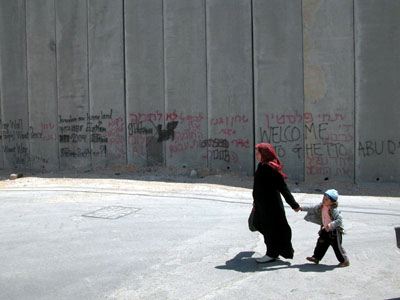home | about the program | program documents | faculty| projects
About Borders of Identity
The post-9/11 climate reinforced polarities in U.S. nationalist discourse, between "civilization" and "barbarism", freedom and tyranny, "us" and "them." Markers of identity, like "Muslim" and "immigrant," have become social categories upon which U.S. domestic and foreign policy hinge. They situate groups and communities, marking out areas of seemingly incompatible differences.
Our focus in fall quarter will be on exploring the border as a geographical construction and social metaphor. A border can define and enforce nationality; it can indicate the boundaries between self and other; it can be experienced internally as part of a complex identity. Borders carry with them implications of sameness and difference, safety and danger, power and powerlessness. How we experience a border, how we cross it, and how we are changed by that movement--these are questions that lie at the heart of the social and political dilemmas we face today.
 We will examine the borderlands where identities of nation, race, ethnicity, religion, class and gender are challenged and converge. We will focus on identities as interdependent and intercommunal by pursuing the following questions: what are the master narratives shaping U.S. identity? How do we understand our personal and collective identities in relation to others? How are our stories and experiences of self, home and nation part of narratives we share with those whose power and privilege differ from ours? How do we engage in critical solidarity with those we were taught to see as "other" and "outside"?
We will examine the borderlands where identities of nation, race, ethnicity, religion, class and gender are challenged and converge. We will focus on identities as interdependent and intercommunal by pursuing the following questions: what are the master narratives shaping U.S. identity? How do we understand our personal and collective identities in relation to others? How are our stories and experiences of self, home and nation part of narratives we share with those whose power and privilege differ from ours? How do we engage in critical solidarity with those we were taught to see as "other" and "outside"?
The tragic events of September 11, 2001, challenged people in the United States to rethink our global role, recognize our suffering as a moment of solidarity with suffering peoples around the world, and reconfigure our policies. Instead the country was led into an extended, polarizing "war on terror" that drew new borders in order to justify military expansion abroad and the suppression of civil liberties at home. We will examine and interrogate this process, and seek new models--drawn from local and international communities--that enable practices of connection and solidarity, rather than polarization and conquest. We will do this through readings and film viewings that include autobiography, fiction, poetry, oral histories, and political and historical analysis. We will focus especially on immigration (the U.S./Mexico border), personal/social identity and the Middle East (Israel/Palestine).